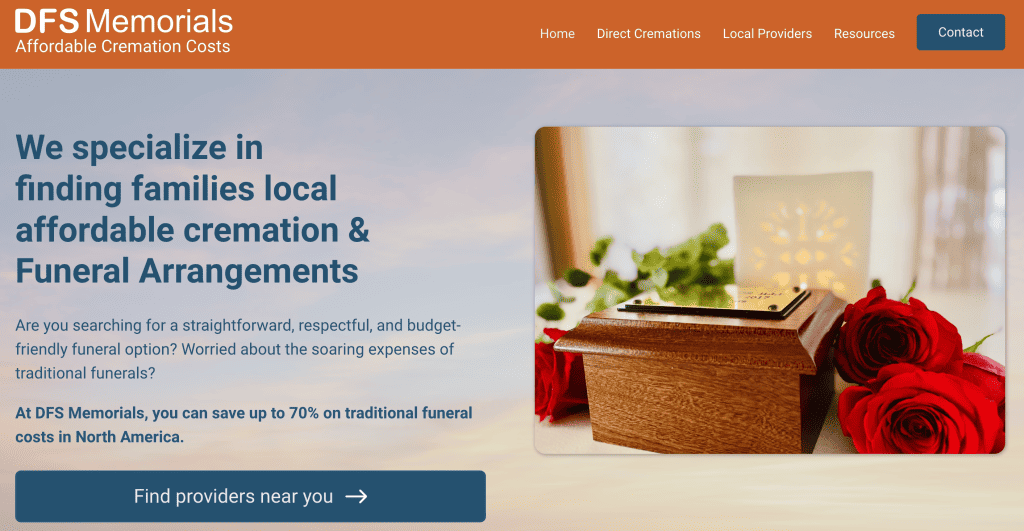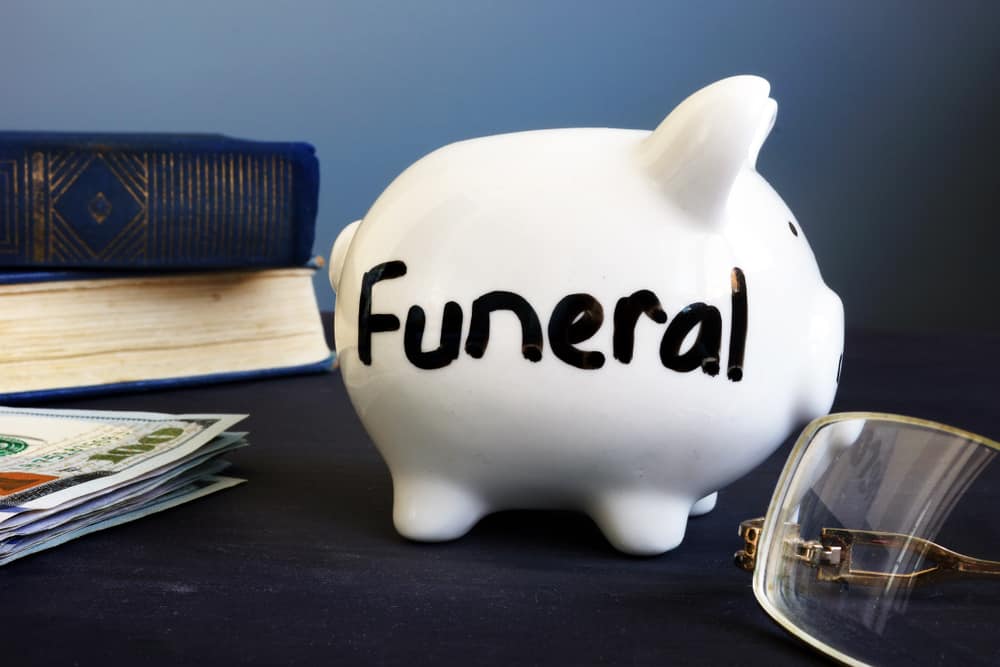Tough economic times have left many families struggling with day-to-day expenses, with little savings to cope with an emergency. Unfortunately, death is still a taboo subject in our society, so often, a family member can pass, and there has been no preparation for their funeral.

This can mean that no financial provision has been made and/or no funeral choices or wishes have been implemented. When this happens, sometimes surviving families try and seek state financial assistance or opt for an indigent funeral provided by the local county.
If you are faced with the loss of a loved one and are without the means to pay for their funeral, you need to make some decisions about how to proceed. Here we have outlined what some of your options are and what choices you have.
What is an ‘Indigent Burial’?
Indigent refers to someone who is considered “poor,” “needy,” or “poverty-stricken.” The state has always had an obligation to take care of the disposition of those who become the state’s responsibility as indigents, and this may be those unfortunate who find themselves in state care (Mental hospitals, care homes, penitentiaries, or homeless people). In many cases, there is no family to step in and take care of any funeral arrangements anyway.
Indigent burial programs also extend to help those who were very needy in some states and counties. This may be families on welfare and, more recently, in some counties, has extended to those who are considered low-income families.
In some areas of the US, indigent burial programs are also offered to Native American Indians.
I must point out, though, that the level and availability of indigent financial assistance for a funeral varies across the country. Some states have state-level programs, and in some areas, it is managed at a county level.
Use this chart on Social Assistance Funeral Programs or Welfare Funeral Benefits to determine what is available in your state.
Who qualifies for public assistance for a funeral?
Qualification for public assistance for a funeral varies by state and often by county. If you are on welfare or another state assistance program, you may qualify for some financial assistance. In many instances, you would need to be classed as “living below the poverty line,” as your state defines it.
Qualification criteria can be rigid. Do consider that a low-cost direct cremation service could take care of your loved ones in a dignified and inexpensive way. DFS Memorials providers offer direct cremation services starting at $695. Use the link below to find a provider near you.

What is “living below the poverty line”?
Most countries define a poverty threshold as a monetary amount that a person or household lives on that equates to being below the poverty line. This not only varies by country but can also vary by state in the USA.
In the United States, the poverty threshold for a single person under 65 is an annual income of $13,590. For a household, the poverty threshold is increased by $4,720 for each additional family member.
So, for a family group of four, including two children, it is $27,750.

What help is there to pay for a funeral?
If you need help to pay for a funeral, you should contact your county Department of Human Services, Department of Public Health, or Welfare Department to find out if you qualify for any public aid for a funeral.
Individuals who are on Social Security from the federal government may also be entitled to claim a fixed death benefit payment of $255. This assistance is only payable if there is a surviving spouse or child under the age of 18.
Veterans are entitled to certain federal benefits which are managed by the Veteran’s Administration (VA). Veterans (and certain dependents) are entitled to a free cemetery plot, grave marker, and a USA flag.
In some cases, funeral service providers offer additional benefits for Veterans, such as free copies of death certificates and discounts on funeral services.
There are also charitable organizations that maintain funds to help needy families with funeral costs. These vary by area, and you would need to make inquiries at a local level from local community and church organizations.
How do I go about claiming state assistance to help with funeral costs?
To claim financial assistance for funeral expenses, you must submit an application to your Department of Human Services (Social Services/Welfare). You must also submit evidence that you qualify in terms of your welfare or low-income status. A claim generally needs to be made within a certain time frame after the death of your family member.
Check our chart about state burial assistance programs to find out more.
In some cases, the costs to cover a basic service are paid directly to the funeral home, and in some areas, only certain funeral homes handle indigent burial cases.
There are a few states where burial assistance is payable directly to the family to reimburse the family for costs incurred.
What if I do not qualify for an indigent burial assistance program but cannot afford a funeral?
Sadly, we are contacted daily by families who find themselves in this unfortunate position. If you cannot afford a funeral but lack the funds to cover funeral costs, you really need to look at how you can arrange a funeral at a minimal cost.
Here are some options for how you can arrange a funeral and keep your costs down:
Home Funeral
In all but 10 states, it is perfectly legal to conduct death care without employing a funeral director. This can save you hundreds, if not thousands, of dollars. You can purchase a casket directly from a casket retailer. Even Walmart and Costco now sell low-cost caskets online for around $1,000.
You must apply to the county for the death certificate and a burial or cremation permit and transport the deceased to the cemetery or crematory. You can conduct your own funeral services and make your own memorial tributes, saving you money. If you are in a state that permits burial on your own land, this can also save on cemetery costs.
Green Burial
A simple green burial can be a cost-saving option. No expensive casket is required, and the body can be buried with minimum intervention, even wrapped in a cotton or bamboo shroud.
You need to check available green burial sites. Most do charge fees for a natural burial site. However, some green burial sites do offer free plots (or a donation option) to those who are struggling to meet funeral costs.
You can use our directory of Green Burial cemeteries in the United States to locate a natural burial site near you.
Direct Cremation
A direct cremation is often the lowest-cost disposition method. In some areas, you can deal directly with the crematory and arrange an immediate cremation of the deceased with no services.
The cremation is performed using a simple cremation container (reinforced cardboard box), and once complete, the cremated remains are returned directly to the family in a temporary urn.
In most metro areas, a direct cremation can be arranged for between $695 and $1,000. DFS Memorials is a nationwide service that helps families locate a local low-cost provider.
Visit the DFS Memorials website to find a low-cost direct cremation provider near you, how much they charge, and their contact information.
Crowdfunding a funeral
This is a new way for families to find help funding a funeral. Crowdfunding websites originated to raise funding for enterprise projects, but an opportunity to apply the technology to generate funds for funeral costs soon emerged.
Read this article on Crowdfunding a Funeral to learn more.
Whole Body Donation
It is possible to donate a whole body to science upon death. You can pre-register to become a whole-body donor, or you can opt for this as an option when a family member passes. However, not all donors are accepted at the time of death, so you cannot rely upon body donation as a guaranteed end-of-life option.
To learn more about body donation, read Donating a Body to Science.
Veteran’s Funeral Benefits
All veterans (and some of their dependents) are entitled to certain funeral benefits. An honorably discharged veteran is entitled to a free burial plot in a National VA Cemetery, a burial flag, a government grave marker, and a presidential memorial certificate. Some funeral providers offer additional benefits such as free death certificates and/or discounts on the funeral service charge.
Where can I go to get support to help me?
If you have a loved one who has passed and you find yourself without the resources to pay for the funeral, you may wish to contact your county human services or social services department in the first instance to check if you qualify for any assistance.
There are a range of organizations and agencies that may also be able to offer advice and assistance to help you through the funeral arrangement process. At US Funerals Online, we have a comprehensive selection of Resources to assist you with making funeral arrangements and saving money on funeral costs.
Check out our Funeral Resources section.
The DFS Memorials network consists of over 90 independent funeral service providers who offer low-cost cremation and/or burial services to their local communities.
The Funeral Consumers Alliance has chapters throughout the US, some of which offer consumer information and funeral home price comparison surveys.
You will also find that there are different agencies at a local level that may offer guidance and support if you are dealing with the death of a family member and struggling with finances.
Hospice Social Workers, Chaplains, and Church Ministers all tend to have experience supporting families during their time of need and usually know of local resources that may help.
Hopefully, this information can help you be better informed about the options available to you if you cannot pay for a funeral or have very limited resources. If the deceased had no life insurance or funeral provision, it is important to ensure you do not financially burden yourself with funeral expenses.

